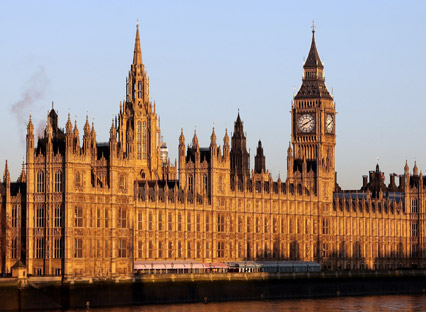Constituency boundary shake-up: everything you need to know
Labour says plans to slash Britain’s 650 MPs to 600 are part of Tory ‘power grab’

A free daily email with the biggest news stories of the day – and the best features from TheWeek.com
You are now subscribed
Your newsletter sign-up was successful
The political map of Britain may soon be redrawn, following the publication of the final recommendations for new parliamentary boundaries.
If approved, the proposal from the independent Boundary Commission would see the number of MPs reduced from 650 to 600 and make constituencies more equal in size.
The changes would trigger a major shake-up in seats, with some disappearing altogether, including Labour leader Jeremy Corbyn’s Islington North seat in London.
The Week
Escape your echo chamber. Get the facts behind the news, plus analysis from multiple perspectives.

Sign up for The Week's Free Newsletters
From our morning news briefing to a weekly Good News Newsletter, get the best of The Week delivered directly to your inbox.
From our morning news briefing to a weekly Good News Newsletter, get the best of The Week delivered directly to your inbox.
The Labour Party has accused the Conservatives of orchestrating an “undemocratic power grab”, but the Government insists the current boundaries, decided by population figures, are out of date.
So what difference would the proposed changes make and which parties have the most to lose?
Why are boundaries changing?
Under UK law, the size and shape of parliamentary boundaries must be periodically reviewed in order to keep up with changes in population size.
A free daily email with the biggest news stories of the day – and the best features from TheWeek.com
The Government says the changes are long overdue, with large variations in the number of voters in different seats that puts the Tories at a disadvantage.
The changes were “meant to happen while the coalition government was in power between 2010 to 2015”, but the plan was abandoned in 2013 after the Lib Dems withdrew their support, reports the BBC.
What difference will it make?
Under the latest proposals, the number of constituencies would be cut from 650 to 600, and constituencies would contain between 71,031 and 78,507 voters each.
As well as Corbyn’s Islington North seat, former Brexit secretary David Davis would also see his Haltemprice and Howden seat disappear.
Political analysts agree that the planned changes are likely to benefit the Conservatives the most, while putting Labour at a disadvantage.
Under the new system, the hung parliament of the 2017 election would probably have resulted in a safe Conservative majority, says The Guardian’s Peter Walker.
However, some big-name Tories, including former foreign secretary Boris Johnson, “could face a tougher battle due to changes to the composition of their seats”, the BBC reports.
Will the shake-up go ahead?
The proposals will need the backing of MPs and peers, but according to Sky News election analyst Michael Thrasher, winning Commons approval for the changes is likely to prove tricky.
Labour, the Liberal Democrats, the Scottish National Party (SNP) and Plaid Cymru are all against the proposals, meaning the Conservatives will have to rely on their Democratic Unionist Party (DUP) bedfellows, Thrasher says.
“Previously, this was thought unlikely, but the final report may be slightly better for the DUP,” he continues, but adds that the vote “may become more complicated still if individual MPs defy their party whips”.
-
 6 exquisite homes with vast acreage
6 exquisite homes with vast acreageFeature Featuring an off-the-grid contemporary home in New Mexico and lakefront farmhouse in Massachusetts
-
 Film reviews: ‘Wuthering Heights,’ ‘Good Luck, Have Fun, Don’t Die,’ and ‘Sirat’
Film reviews: ‘Wuthering Heights,’ ‘Good Luck, Have Fun, Don’t Die,’ and ‘Sirat’Feature An inconvenient love torments a would-be couple, a gonzo time traveler seeks to save humanity from AI, and a father’s desperate search goes deeply sideways
-
 Political cartoons for February 16
Political cartoons for February 16Cartoons Monday’s political cartoons include President's Day, a valentine from the Epstein files, and more
-
 How corrupt is the UK?
How corrupt is the UK?The Explainer Decline in standards ‘risks becoming a defining feature of our political culture’ as Britain falls to lowest ever score on global index
-
 The Mandelson files: Labour Svengali’s parting gift to Starmer
The Mandelson files: Labour Svengali’s parting gift to StarmerThe Explainer Texts and emails about Mandelson’s appointment as US ambassador could fuel biggest political scandal ‘for a generation’
-
 Reforming the House of Lords
Reforming the House of LordsThe Explainer Keir Starmer’s government regards reform of the House of Lords as ‘long overdue and essential’
-
 How long can Keir Starmer last as Labour leader?
How long can Keir Starmer last as Labour leader?Today's Big Question Pathway to a coup ‘still unclear’ even as potential challengers begin manoeuvring into position
-
 Three consequences from the Jenrick defection
Three consequences from the Jenrick defectionThe Explainer Both Kemi Badenoch and Nigel Farage may claim victory, but Jenrick’s move has ‘all-but ended the chances of any deal to unite the British right’
-
 The high street: Britain’s next political battleground?
The high street: Britain’s next political battleground?In the Spotlight Mass closure of shops and influx of organised crime are fuelling voter anger, and offer an opening for Reform UK
-
 Biggest political break-ups and make-ups of 2025
Biggest political break-ups and make-ups of 2025The Explainer From Trump and Musk to the UK and the EU, Christmas wouldn’t be Christmas without a round-up of the year’s relationship drama
-
 The MAGA civil war takes center stage at the Turning Point USA conference
The MAGA civil war takes center stage at the Turning Point USA conferenceIN THE SPOTLIGHT ‘Americafest 2025’ was a who’s who of right-wing heavyweights eager to settle scores and lay claim to the future of MAGA